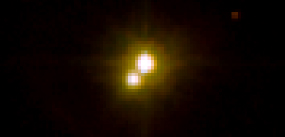Syllabus
Downloadable syllabus [pdf]
AST 307
"Introductory Astronomy"
Spring 2012
Professor Gregory A. Shields
MWF 11-12 (Unique No. 47635)
RLM 5.104
Course Description
What are the stars? How old are they, how were they born, and when will they die? How does our Milky Way compare to other galaxies? How did the Universe begin and how did it evolve into its present form? What processes led to the formation of stars and planets? What is the future of the solar system, the Galaxy, and the universe? Are we alone in the universe?
These questions fascinate everyone. Astronomers have some answers, but many questions remain. This course gives a survey of modern astronomy. Topics include the solar system, exoplanets, stars, interstellar gas, galaxies, quasars, the Big Bang, dark matter and dark energy, and life in the universe. The goals are to leave the student with a picture of our place in the universe and a foundation in the use of observational technique and physical laws to understand nature.
Lectures will be illustrated with images and videos. Mathematics will include high school algebra but no calculus. Some homework assignments may involve nighttime observations.
Prerequisite. Math 305G or equivalent
Instructor. Professor Raphael Flauger. Office: RLM 9.301. Phone: . E-mail: shieldsga@mail.utexas.edu. Office Hours (subject to change):
Web page: https://www.as.utexas.edu/~shields/shields.html
Teaching Assistant: TBA
Grading: The course grade will be based on three one-hour exams in class, and homework. (No final exam.) Exams will be closed book and will involve both multiple choice and essay questions. Exams will cover lectures, assigned reading, and homework. Make-up tests will not be given except for a compelling reason presented in advance or in case of illness. Exam weights and tentative dates are:
|
First exam |
20% |
TBA |
|
|
25% |
TBA |
|
Third exam |
25% |
TBA |
Homework will count 30%, based on grading of selected problems from homework sets.
Help sessions. Some of the lecture before each exam will be devoted to reviewing the material on the exam. Additional help sessions will be scheduled for help with the homework and class material.
Required text. Jeffrey Bennett et al. “The Cosmic Perspective” (2010, 6th edition, ISBN 978-0-321-62090-3). [Note: there are abbreviated versions of this book, devoted to “The Solar System” or to “Stars, Galaxies, and Cosmology” as well as an “Essential” version. We fill use the full version. New copies come with a packet containing an access code to set of on-line materials called “Mastering Astronomy”. This is not a required part of the course, but some students find it helpful. You are free to buy a used copy of the book without this packet; an access code can be purchased from the publisher if desired.]
Drop Dates. February 1 is the last day to drop a class for a possible refund. April 2 is the last day to change to or from the credit/no credit basis. After April 2, you may drop the course or withdraw from the University only for urgent and substantiated, nonacademic reasons. Please consult the University's published calendar (http://registrar.utexas.edu) to verify these dates and for further information.
Star Parties. Every Wednesday evening, if the weather is clear, there will be astronomical viewing with the 16-inch telescope on the roof of RLM Hall. These sessions will start about 7 p.m. during standard time and 8 p.m. when daylight saving time is in effect. There is also a 9-inch telescope on Painter Hall that is open to UT students on Friday evenings and to the general public on Saturday evenings. For observing hours, see the Department of Astronomy public outreach Web page at http://outreach.as.utexas.edu/public. You can use the 9-inch yourself if you are checked out on it. McDonald Observatory in west Texas has star parties and public nights (see http://mcdonaldobservatory.org/visitors/programs; phone 471-5285).
About the Instructor: Professor Shields was born in Los Angeles and grew up in Nebraska and Kansas. He earned a B.S. in Physics from Stanford University in 1968 and a Ph.D. in Astronomy at Caltech in 1973. Following a postdoctoral fellowship at Harvard, he joined the UT faculty in 1974. He now holds the title of The Jane and Roland Blumberg Centennial Professor in Astronomy, and served as Chairman of the Department of Astronomy from 1990 to 1994. He teaches both graduate and undergraduate courses at UT. His research interests include studies of nebulae, quasars, and black holes, and he has published numerous research papers and popular articles.
Other Astronomy Courses. For other courses offered by the Department of Astronomy, see https://www.as.utexas.edu or the UT Undergraduate Catalog or the UT Course Schedule (http://registrar.utexas.edu).
